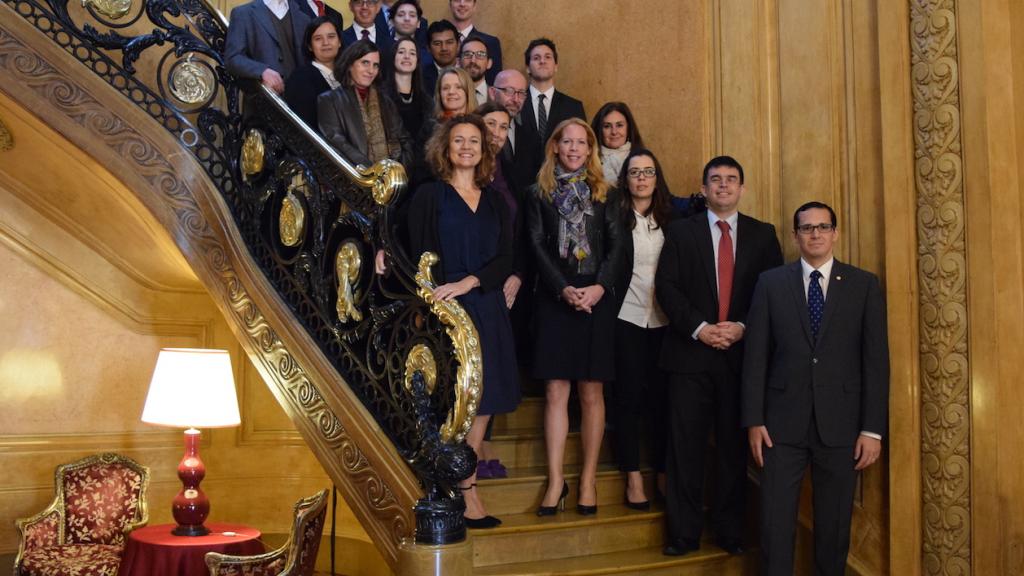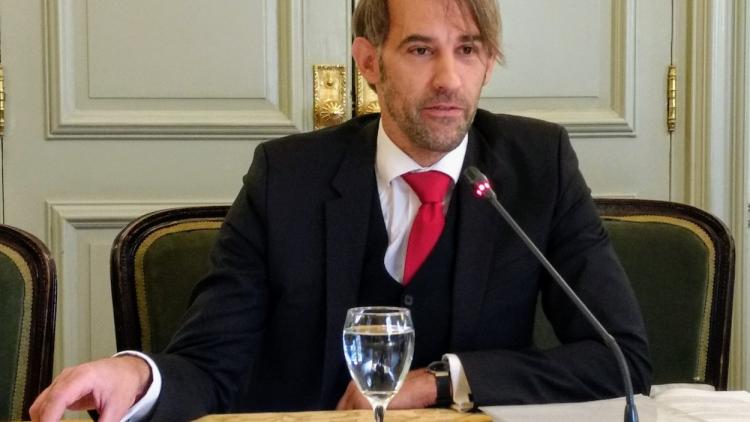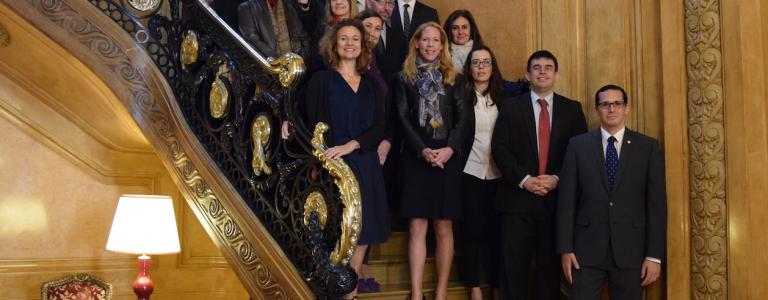Meeting of Negotiators on Investment Agreements and Dispute Settlement – Buenos Aires
IISD and the Secretariat of International Economic Relations of the Ministry of Foreign Affairs and Worship of the Argentine Republic co-hosted a meeting of negotiators on investment treaties and the settlement of investment disputes in Buenos Aires, Argentina, from September 13 to 15, 2017.
IISD and the Secretariat of International Economic Relations of the Ministry of Foreign Affairs and Worship of the Argentine Republic co-hosted a meeting of negotiators on investment treaties and the settlement of investment disputes in Buenos Aires, Argentina, from September 13 to 15, 2017.
[Ver texto en español más abajo]
The meeting convened Latin American government officials who shared experiences in the negotiation of investment treaties and chapters at the bilateral, regional and multilateral levels, as well as identified alternatives and possible answers to the various challenges in the negotiation arena.
It also provided an opportunity to present and discuss trends in investment negotiations and initiatives for the reform of the international investment regime, in both in its substantive and procedural aspects.
Experts from IISD, the United Nations Conference on Trade and Development (UNCTAD) and the Organisation for Economic Co-operation and Development (OECD) participated as speakers in the event.
On the first day, Argentinian parliamentarians and policy-makers met in separate closed sessions to discuss foreign investment policy in Argentina.
On the second and third days, investment treaty negotiators from seven Latin American countries—Argentina, Bolivia, Brazil, Chile, Paraguay, Peru and Venezuela—engaged in open and frank discussions on investment negotiations and dispute settlement.
The main points of discussion and conclusions include the following:
- There is no proven causal link between the conclusion of investment treaties and the attraction of foreign investment that contributes to the sustainable development of the host state.
- The protection of foreign investors and investments must not result in a restriction of the state’s right to regulate in the public interest. Investment treaties must create legal security not only for foreign investors and their investments but also for their host states.
- Various participants shared the experiences of their governments in investment dispute settlement. They confirmed that investment treaties, especially first-generation ones, have generated various problems because of their vagueness and ambiguity and because of the abuses by arbitral tribunals in their interpretation.
- There is international momentum for structural reform of the investment treaty regime, in its substantive and procedural aspects.
- It is extremely important for Latin American countries to participate actively in reform discussions at the multilateral level, such as those initiating within the framework of Working Group III of the United Nations Commission on International Trade Law (UNCITRAL) on possible reform of investor–state dispute settlement (ISDS). They should also follow the discussions led by the European Union and Canada on forming a permanent multilateral system for the settlement of investment disputes, including an appeals mechanism.
- Among the various options discussed by participants to reform the regime, the following can be highlighted:
- Denouncing first-generation investment treaties.
- Renegotiating first-generation investment treaties.
- Incorporating clearer and more precise standards and safeguarding the state’s right to regulate in current and future investment treaties negotiations.
- Issuing joint interpretations to guide the appropriate interpretation and application of investment treaties.
- Adopting models that focus on facilitation and cooperation in foreign investment matters.
- Strengthening national systems for the protection of foreign investors and their investments and for the prevention and settlement of investment disputes.
- Revising investment dispute settlement mechanisms regarding transparency, the appointment of arbitrators, opportunities for participation of affected communities and individuals, codes of conduct for arbitrators, tribunals and arbitral institutions, among other aspects.
- Choose alternative dispute settlement forums, such as the Centre for the Settlement of Investment Disputes currently in negotiation under the auspices of the Union of South American Nations (UNASUR).
For more information on the topics discussed, see the event agenda.
Read the press release issued by the Ministry of Foreign Affairs and Worship of the Argentine Republic about the event: https://www.mrecic.gov.ar/i-encuentro-internacional-de-negociadores-latinoamericanos-de-acuerdos-de-inversiones-en-el-palacio (in Spanish only).
Encuentro de Negociadores en Materia de Tratados y Controversias de Inversiones – Buenos Aires
IISD y la Secretaría de Relaciones Económicas Internacionales del Ministerio de Relaciones Exteriores y Culto de la República Argentina han coorganizado una reunión de negociadores sobre acuerdos y solución de controversias en materia de inversiones en el Palacio San Martín, en Buenos Aires, Argentina, del 13 al 15 de septiembre de 2017.
El encuentro ha reunido funcionarios de gobiernos latinoamericanos quienes han compartido experiencias en la negociación de acuerdos y capítulos de inversiones a nivel bilateral, regional y multilateral e identificado alternativas y posibles respuestas a los varios desafíos en el ámbito de negociaciones.
Asimismo, ha proveído una valiosa oportunidad para divulgar y discutir las tendencias en negociaciones en materia de inversiones e las iniciativas de reforma del régimen internacional de inversiones, en sus aspectos tanto sustantivos como procedimentales.
Expertos de IISD, de la Conferencia de Naciones Unidas sobre Comercio y Desarrollo (UNCTAD) y de la Organización para la Cooperación y el Desarrollo Económicos (OCDE) han participado como expositores en el evento.
Durante el primer día, legisladores y autoridades argentinas se han reunido en sesiones cerradas y separadas para discutir posibles políticas para las inversiones extranjeras en Argentina.
En el segundo y tercer días, negociadores de tratados de inversiones de siete países latinoamericanos –Argentina, Bolivia, Brasil, Chile, Paraguay, Perú y Venezuela– han participado de discusiones abiertas y francas sobre negociaciones y controversias de inversiones.
Entre los principales puntos de discusión y conclusiones se destacan:
- No se ha comprobado la existencia de un nexo causal entre la conclusión de acuerdos de inversiones y la atracción de inversiones extranjeras que contribuyan al desarrollo sostenible del Estado anfitrión.
- La protección de inversiones e inversores extranjeros no debe dar como resultado una restricción al derecho del Estado a regular en el interés público. En este sentido, los acuerdos de inversiones deben proveer seguridad jurídica no solo para los inversores extranjeros y sus inversiones, sino también para los Estados receptores de dicha inversión.
- Un significativo número de participantes compartieron las experiencias de sus gobiernos en materia de controversias de inversiones. Han confirmado que los acuerdos de inversiones, especialmente los de primera generación, han generado numerosos problemas debido a su vaguedad y ambigüedad y por los abusos de los tribunales arbitrales en su aplicación.
- Existe un momentum internacional de reforma estructural del régimen de acuerdos de inversiones, en sus aspectos sustantivos y procedimentales.
- Es extremamente importante que los países latinoamericanos participen activamente en las discusiones de reforma del sistema a nivel multilateral, tales como las que se están iniciando en el marco del Grupo de Trabajo II de la Comisión de las Naciones Unidas para el Derecho Mercantil Internacional (CNUDMI) sobre una posible reforma del mecanismo de solución de controversias entre inversores y Estados (ISDS). También resulta importante que los Estados latinoamericanos sigan las discusiones lideradas por la Unión Europea y el Canadá sobre la conformación de un sistema multilateral permanente de solución de controversias en materia de inversiones, incluyendo aquella referida a la instalación de una instancia de apelación.
- Entre las distintas opciones discutidas para reformar el régimen por los participantes del encuentro se destacan las siguientes:
- Denunciar los acuerdos de inversiones de primera generación.
- Renegociar los acuerdos de inversiones de primera generación.
- Incorporar estándares más precisos y claros y asimismo salvaguardar el derecho del Estado a regular en los acuerdos de inversiones que se negocien actual y futuramente.
- Realizar declaraciones conjuntas para orientar la adecuada interpretación y aplicación de los acuerdos de inversiones.
- Adoptar modelos que se focalicen en la facilitación y cooperación en materia de inversiones extranjeras.
- Fortalecer los sistemas nacionales de protección de inversores extranjeros y sus inversiones y de prevención y solución de controversias en materia de inversiones.
- Revisar los mecanismos de solución de controversias de inversiones en lo referente a la transparencia, la selección de los árbitros, las oportunidades de participación de comunidades e individuos afectados, las normas de conducta y actuación de árbitros, tribunales e instituciones arbitrales, entre otros aspectos.
- Elegir foros alternativos para la solución de controversias, tales como el Centro de Solución de Controversias en Materia de Inversiones actualmente en negociación bajo los auspicios de la Unión de Naciones Suramericanas (UNASUR).
Para más información acerca de los temas discutidos, consulte la agenda del evento.
Lea aquí el comunicado de prensa publicado por el Ministerio de Relaciones Exteriores y Culto de la República Argentina acerca del evento: https://www.mrecic.gov.ar/i-encuentro-internacional-de-negociadores-latinoamericanos-de-acuerdos-de-inversiones-en-el-palacio.

Group photo

Meeting of legislators
Meeting of negotiators: plenary
Meeting of negotiators: UNCTAD presentation

Meeting of negotiators: OECD presentation
Meeting of negotiators: IISD presentation
Meeting of negotiators: IISD presentation
Meeting of negotiators: Brazil
Meeting of negotiators: Chile
Meeting of negotiators: group exercise
Meeting of negotiators: group exercise
Meeting of negotiators: group exercise
Meeting of negotiators: Peru
Meeting of negotiators: Argentina
Meeting of negotiators: Brazil
Upcoming events
Building Bridges: The State of Nature-Based Investments
Join us for a panel at the Building Bridges conference in Geneva, Switzerland, to discuss the state-of-play of nature-based investments and the potential opportunities they present.
Through Her Lens: Women leading change in sustainable agriculture and market inclusion
Despite the critical role that women play in agricultural production, they still do not have equal access to global agricultural supply chains on terms that benefit them.
A Municipal Perspective on the Value of Natural Infrastructure
This webinar will showcase examples the cost-effectiveness of natural infrastructure from a municipal perspective. Focusing on what municipalities need—what evidence and numbers they rely on, and what tools and planning processes are required to ensure that natural infrastructure is assessed alongside traditional infrastructure for cost-effectiveness.
